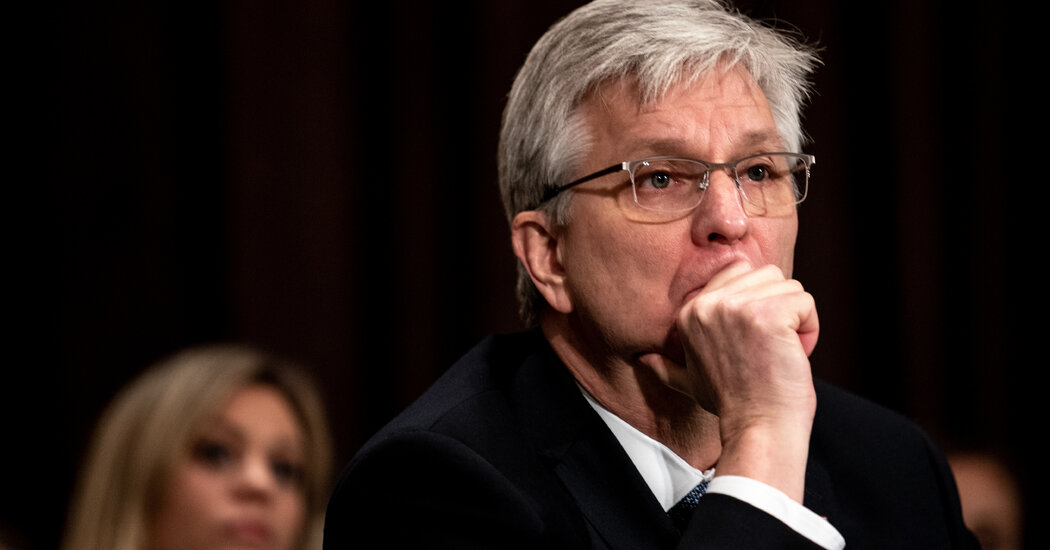Christopher Waller, a governor at the Federal Reserve, faced an uncomfortable task on Friday night: He delivered remarks at a conference packed with leading academic economists titled, suggestively, “How Monetary Policy Got Behind the Curve and How to Get Back.”
Fed officials — who set America’s monetary policy — have found themselves on the defensive in Washington, on Wall Street and within the economics profession as inflation has run at its fastest rate in 40 years. Friday’s event, at Stanford University’s Hoover Institute, was the clearest expression yet of the growing sense of skepticism around the Fed’s recent policy approach.
The Fed is raising interest rates, and on Wednesday lifted them by the largest increment since 2000. But prominent economists on Friday blasted America’s central bankers for being slow to realize that inflation was going to run meaningfully higher in 2021 as big government spending goosed consumer demand. They criticized the Fed for taking monetary policy support away from the economy too haltingly once it began to react. Some suggested that it was still moving tentatively when more decisive action was warranted.
Mr. Waller defended and explained the decisions the Fed made last year. Many inflation forecasters failed to predict the 2021 price burst, he noted, pointing out that the Fed pivoted toward removing policy support starting as early as September, when it became clear that inflation was a problem.
“The Fed was not alone in underestimating the strength of inflation that revealed itself in late 2021,” said Mr. Waller, who expected inflation to be slightly higher than many of his colleagues. He noted that the Fed’s policy-setting committee had to coalesce around policy moves, which can take time given its size: It has 12 regional presidents and up to seven governors in Washington.
Understand Inflation in the U.S.
“This process may lead to more gradual changes in policy as members have to compromise in order to reach a consensus,” Mr. Waller said.
Such explanations have done little to shield the Fed so far. Lawrence H. Summers, a former Harvard president and Treasury secretary, suggested earlier Friday that an economic overheating was predictable last year as the government spent heavily and that “it was reasonable to expect that the bathtub would overflow.” Kevin Warsh, a former Fed governor, called inflation “a clear and present danger to the American people,” and declared the Fed’s reaction “slow.”
And even as the Fed comes under fire for responding too ploddingly as inflation pressures began to build, a new debate is evolving over how quickly — and how much — rates need to increase to catch up and wrestle fast price increases back under control.
The Fed lifted interest rates half a percentage point this week and forecast more to come. Still, Jerome H. Powell, the Fed chair, said officials were not discussing an even larger, 0.75-point move — suggesting that central bankers are still hoping to control inflation without choking off growth abruptly and shocking the economy.
“If supply constraints unwind quickly, we might only need to take policy back to neutral or go modestly above it to bring inflation back down,” Neel Kashkari, the president of the Federal Reserve Bank of Minneapolis, wrote in a post on Friday. “Neutral” refers to the policy setting that neither stokes nor slows the economy.
Inflation F.A.Q.
What is inflation? Inflation is a loss of purchasing power over time, meaning your dollar will not go as far tomorrow as it did today. It is typically expressed as the annual change in prices for everyday goods and services such as food, furniture, apparel, transportation and toys.
Still, officials have been clear that if inflation doesn’t begin to fade, they will turn more aggressive, potentially pushing up unemployment and causing a recession.
“If they don’t unwind quickly or if the economy really is in a higher-pressure equilibrium, then we will likely have to push long-term real rates to a contractionary stance,” Mr. Kashkari wrote Friday.

